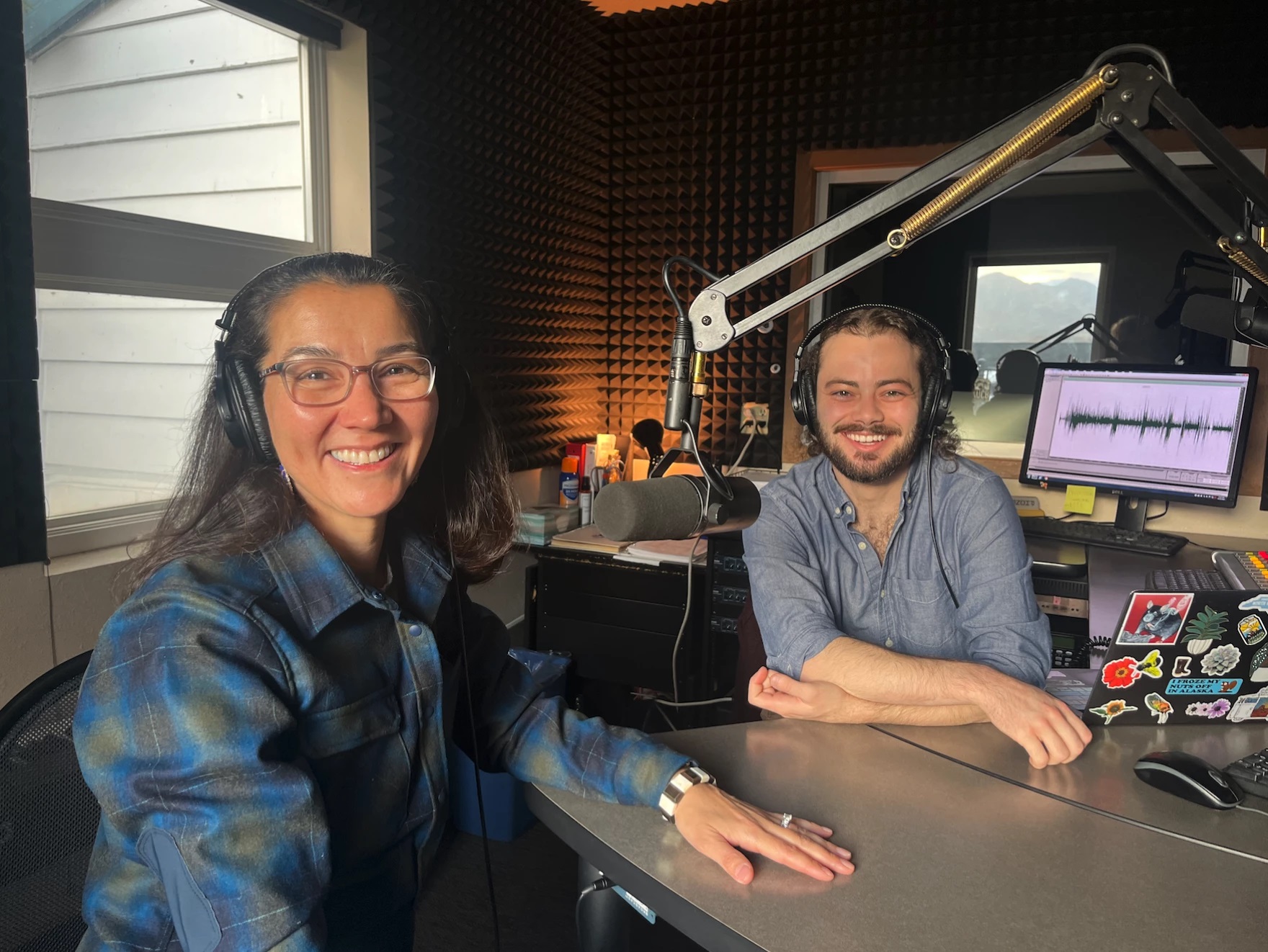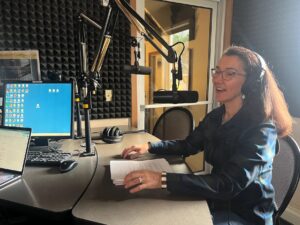Rep. Mary Peltola talks regional fisheries, Arctic security during Unalaska visit
Description
 <figcaption class="wp-element-caption">Rep. Mary Peltola spoke with KUCB reporter Andy Lusk during an October 2024 Unalaska visit to meet with constituents and local officials. (Lauren Adams/KUCB)</figcaption></figure>
<figcaption class="wp-element-caption">Rep. Mary Peltola spoke with KUCB reporter Andy Lusk during an October 2024 Unalaska visit to meet with constituents and local officials. (Lauren Adams/KUCB)</figcaption></figure><figure class="wp-block-audio"></figure>
Congresswoman Mary Peltola has served as the State of Alaska’s only representative in the U.S. House since 2022. She was previously a tribal judge and is the first Alaska Native person in Congress. She’s running for reelection in November and stopped by Unalaska to hear more about the community’s unique concerns.
Peltola is visiting the island to meet with constituents and local officials. The Aleutian community of around 4,500 residents had a lot to ask their representative, who spoke at a public forum Tuesday in the library and later talked with locals at the island’s Norwegian Rat Saloon. She addressed several topics, including fishing, transportation and education, among others.
Peltola sat down with KUCB’s Andy Lusk the next day to dig into those issues.
This conversation has been lightly edited for clarity.
Andy Lusk: Folks in the Aleutians are worried about the local economy, given a rough few years in the fisheries. Stocks are migrating, returns are generally low, and prices for some species are, too. How do you plan to support this struggling industry on the federal level?
Mary Peltola: We’ve had two really important wins this Congress, and I want to make sure people understand this is the most unproductive, do-nothing Congress since the Civil War, and yet, the senators and I — who work very well together — were able to eke out some really important wins for Alaska.
<figure class="alignright size-medium">
 <figcaption class="wp-element-caption">Peltola addressed several topics, including fishing, transportation and education, among others. (Lauren Adams/KUCB)</figcaption></figure>
<figcaption class="wp-element-caption">Peltola addressed several topics, including fishing, transportation and education, among others. (Lauren Adams/KUCB)</figcaption></figure>Chief among them have been prying loose hundreds of millions of dollars out of the Office of Management and Budget. OMB was sitting on a lot of disaster money all the way from back to 2018. Two of those disaster years really affect Dutch Harbor: Disaster 116, which involved 2021 and 2022 [Alaska] Bering Sea crab fisheries, and Disaster 126, [which involved] 2022 and 2023 Alaska Bering Sea crab fisheries.
Each of those was about $100 million, and we have not only pried that loose, but we have a bill, the FISHES Act, which will streamline the disaster money going forward. What happens is Congress approves it, it goes through a series of steps, and then it gets hung up at OMB for a final approval. We are working through systems to eliminate that final check because it just seems to be holding things up for years and has really drastic consequences for people who are in dire situations with making payments on their boats, paying their crew. Overhead for commercial fishing is very high, as everybody here knows. So that’s one win.
Another tremendous win that we push through and will continue to work on, is the impact of Russian seafood in our market. We have been trying for years. Our senator, Dan Sullivan, has been pushing this executive order for 10 years. We were able to really shove it through with the help of this president and his administration in December.
What this does is it gets around a loophole that Russia had been using, where they were pushing their Russian seafood, marketed as Alaskan seafood, through China with their Uyghur slave labor. They are really crippling our markets by flooding the American market with extra cheap — this is a very concerted effort on the part of Russians. They have put out a lot of hatchery fish. They have been overharvesting at an unsustainable rate. They’re using inhumane labor and workforce, and it’s an overt action to really injure the Alaskan seafood market. We take that very seriously.
We’ve had meetings with Gina Raimondo, she’s the Secretary of Commerce, and we are really working with the [Biden] Administration and DOD. This is a national security issue, and it’s a serious economic issue for communities like Dutch Harbor. The longshoremen brought this up to me yesterday.
We had a large meeting on Tuesday when we flew in [with] a number of the leading organizations in the community: the city, the tribe, the village corporation, the regional corporation, the health nonprofit regional corporation. All these groups came and shared their top objectives, and chief among them is this issue with Russian seafood. That is something we take very seriously, and we’re working hard on.
AL: Earlier this year, you introduced legislation that could weaken the Bering Sea Pollock fishery, which makes up a large chunk of Alaska’s commercial fishing industry. Unalaska is, as I’m sure you’ve heard, the nation’s No. 1 fishing port by volume. I want to know what you would say to concerned residents whose livelihood relies on trawling.
MP: I am very sensitive to the people, the families, who rely on this for their family’s income. And you’ll see that [in] the two pieces of legislation that I put forward.
One is urging the council, the North Pacific Fisheries Management Council, which is very influenced by the industry, all of those board seats are filled by people who are part of the industry or very, very tied to the industry. But it’s urging the council to look at areas that should be protected from bottom trawl. There’s concern with the crab savings area being trawled. There’s concern about the Northern Bering Sea. It’s a piece of legislation that tells all eight of the national councils who allow trawling to say, let’s just put some sideboards and let’s just acknowledge that there are places where we don’t want bottom trawling happening.
Another thing it’s asking is, let’s look at definitions. What is pelagic trawl? What is midwater trawl? Can we legitimately call it a midwater trawl if 60 to 80% of the time it’s on the bottom? Should we be calling that a bottom trawl? And I think those are very reasonable, practical things that the council can do. I don’t think that those are extremely injurious, and I think that reassures the public and reassures other users that there are sideboards, that there are concerns and acknowledgement that we don’t want this to be an unsustainably managed fishery, and everybody is on board with that.
The other thing it does, I have another bill that is more of a carrot than a stick. It’s providing funding and funding sources — additional funding through NOAA, additional funding through philanthropists — to help fishermen get some of the gear that will help: salmon excluders, live cameras. I think this is very well received. It’s, again, more of a carrot than a stick, and it’s saying for the fishermen who are interested in making sure they don’t have unwanted bycatch in their nets, they are implementing tools to alleviate that, and that can only be good.
Embracing technology and innovation can only be good when it’s helping us with issues like this. So I think those are two good pieces of legislation that are a good starting point for a healthy conversation.
AL: When you’re working on legislation, how do you strike a balance between economic and environmental concerns in a state sensitive to changes in both?
MP: It’s many robust conversations. It’s not putting in legislation before you’




